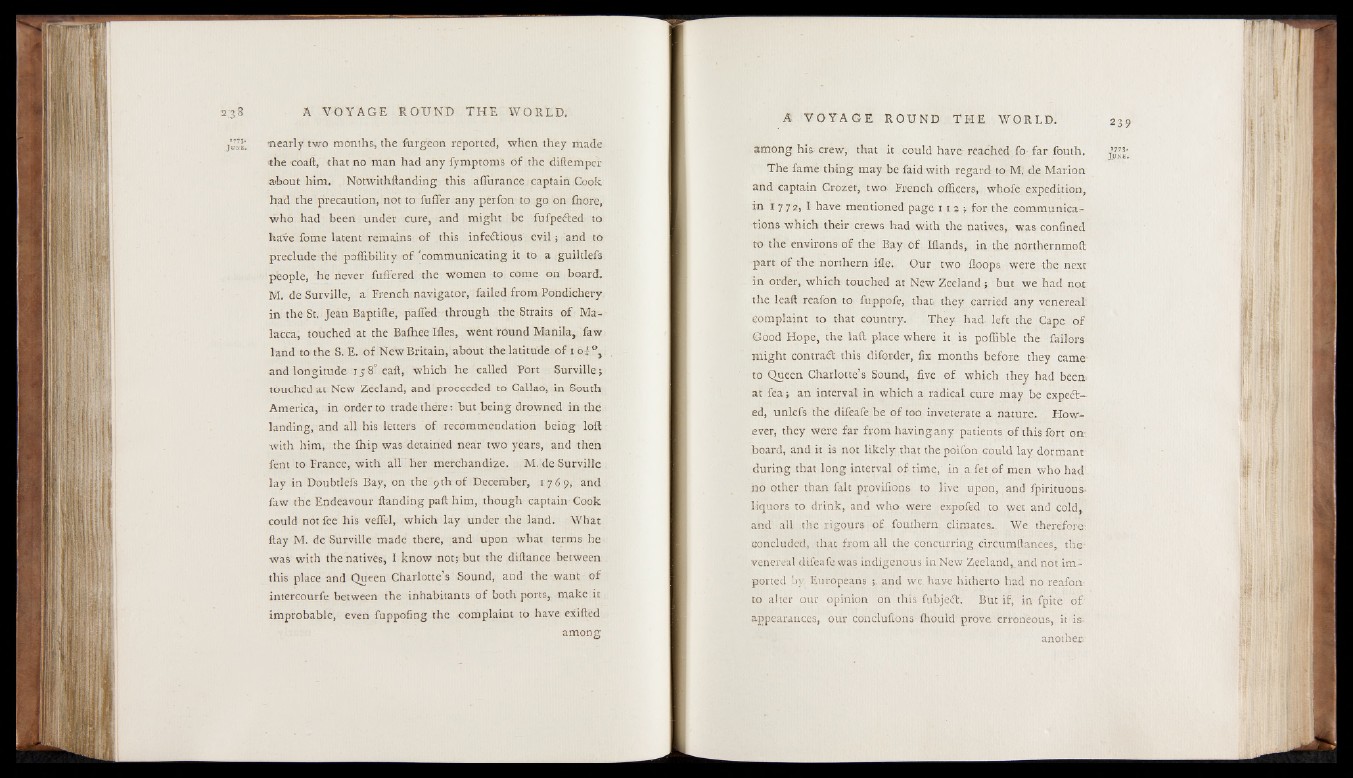
J une. ■ nearly two months, the furgeon reported, when they made
the coaft, that no man had any fymptoms of the diftemper
about him. Notwithftanding this affurance captain Cook
had the precaution, not to fuffer any perfon to go on fiiore,
who had been under cure, and might be fufpefted to
have fome latent remains of this infectious e v il; and to
preclude the poffibility of 'communicating it to a guiltlefs
people, he never differed the women to come on board.
M. de Surville, a French navigator, failed from Pondichery
in the St. Jean Baptifte, paffed through the Straits of Malacca,
touched at the BaGiee Ifles, went round Manila, faw
land to the S. E. of New Britain, about the latitude of i oi °,
and longitude 15 8° eaft, which he called Port Surville;
touched at New Zeeland, and proceeded to Callao, in South
America, in order to trade there: but being drowned in the
landing, and all his letters of recommendation being loft
with him, the fhip was detained near two years, and then
fent to France, with all her merchandize. M. de Surville
lay in Doubtlefs Bay, on the 9 th of December, 1769, and
faw the Endeavour ftanding paft him, though captain Cook
could not fee his veffel, which lay under the land. What
flay M. de Surville made there, and upon what terms he
was with the natives, I know not; but the diftance between
this place and Queen Charlotte’s Sound, and the want of
intercourfe between the inhabitants of both ports, make it
improbable, even fuppofing the complaint to have exifted
among his crew, that it could have reached fo far fouth.
The fame thing may be faid with regard to M. de Marion
and captain Crozet, two French officers, whofe expedition,
in 17 7 2, I have mentioned page 11 2 ; for the communica^
tions which their crews had with the natives, was confined
to the environs of the Bay of Iflands, in the northernmoft
part of the northern ifle. Our two floops were the next
in order, which touched at New Zeeland; but we had not
the leaft reafon to fuppofe, that they carried any venereal'
complaint to that country. They had. left the Cape of
Good Hope, the laft place where it is poffihle the failors
might contract this diforder, fix months before they came
to Queen Charlotte’s Sound, five of which they had been
at fea; an interval in which a radical cure may be expected,
unlefs the difeafe be of too inveterate a nature. However,
they were far from having any patients of this fort onboard,
and it is not likely that the poifon could lay dormant
during that long interval of. time, in a Yet of men who had
no other than fait provifions to live upon, and fpirituous-
liquors to drink, and who were expofed to wet and cold,
and all the rigours of fouthern climates.. We therefore:
concluded, that from all the concurring circumfiances, the-
venereal difeafe was indigenous in New Zeeland, and not .imported
by Europeans ;. and we. have hitherto had no reafon-.
to alter our opinion on this fubjeft. But if, in fpite of
appearances, our conclufions ffiould prove, erroneous, it is:
'771
June